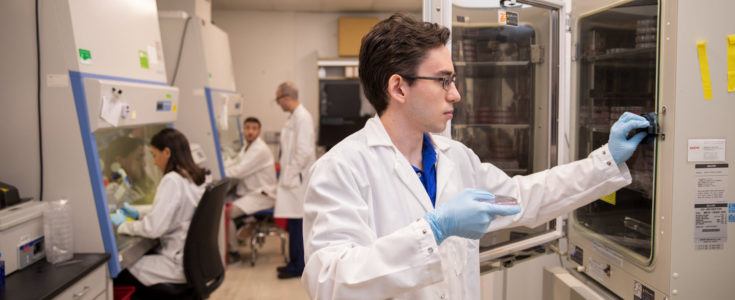
Ivy Blog
Staff Spotlight: Connor White
- March 29, 2021
- Ivy Center
- Posted in #IvyTeam


Job Title: Research Technician
Hometown: Tempe, Arizona
What motivated you to get into the medical field, specifically research?
I wanted to take part in research that can improve the treatment of patients. With the poor patient outcome of glioblastoma in particular, neuro-oncology is a field where a lot of work needs to be done, and I’m passionate about being a part of the solution.
What makes working at IBTC different than other research centers?
Compared to previous experiences, my role in the preclinical lab at the Ivy Center provides a greater sense of importance and urgency. I also find it unique and inspiring to see the strong collaboration between the different Ivy labs as we work together to bring new options to brain tumor patients who need them so desperately.
What is your favorite part about your job?
Each day brings on new and exciting challenges. One of my favorite parts about my job is being able to ask the same questions we ask in our Phase 0 clinical trials in our preclinical studies. My primary role is to generate and characterize preclinical models that can be used by our preclinical team to evaluate new therapeutic regimens. The preclinical team plays an important role in ensuring that only promising new targets with excellent brain penetration properties move into our Phase 0 trials.
What keeps you motivated when dealing with such a complex disease?
Knowing that every little piece of information and research adds to the sum of our knowledge. No single person’s contributions are going to crack the puzzle, but that doesn’t make our contributions any less important. What keeps me motivated is the trust in our process and the focus on our mission to bring a new FDA-approved drug for brain tumor patients within 10 years.
What gives you hope?
Knowing that tomorrow always gives us a chance to do better than yesterday. Even negative trial results give me hope because they allow us to quickly move onto the next thing without wasting patients’ time with ineffective treatment. By testing, and even failing quickly we move closer to our goal of finding an effective treatment. In just under three years, the Ivy Center has initiated more than six clinical trials and identified a number of drugs with excellent brain penetration. I am very hopeful that soon we will be able to identify drug combinations personalized for each patient.
